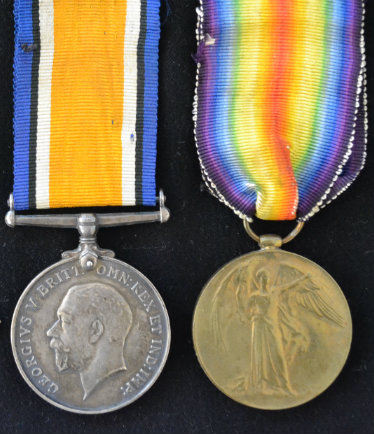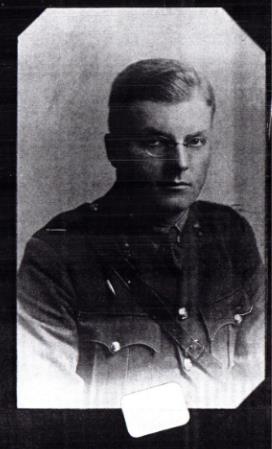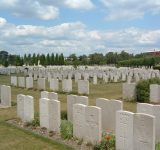Personal Details
John German Harrison, born in Whitchurch in 1891. He was the eldest son of John German and Emma Harrison of Cloverfields, Chester Road, Whitchurch.
John was educated at Shrewsbury School and studied music in Berlin and America. He arrived back in United Kingdom in January 1915 and enlisted.
Military Details
Regiment : Medium Trench Mortar Battery, 32nd Division, Royal Field Artillery
Rank : Captain
Service Number :
Died of Wounds; France 11th April 1918 Age 27

The British War Medal (also known as 'Squeak') was a silver or bronze medal awarded to officers and men of the British and Imperial Forces who either entered a theatre of war or entered service overseas between 5th August 1914 and 11th November 1918 inclusive. This was later extended to services in Russia, Siberia and some other areas in 1919 and 1920. Approximately 6.5 million British War Medals were issued. Approximately 6.4 million of these were the silver versions of this medal. Around 110,000 of a bronze version were issued mainly to Chinese, Maltese and Indian Labour Corps. The front (obv or obverse) of the medal depicts the head of George V. The recipient's service number, rank, name and unit was impressed on the rim.
The Allied Victory Medal (also known as 'Wilfred') was issued by each of the allies. It was decided that each of the allies should each issue their own bronze victory medal with a similar design, similar equivalent wording and identical ribbon. The British medal was designed by W. McMillan. The front depicts a winged classical figure representing victory. Approximately 5.7 million victory medals were issued. Interestingly, eligibility for this medal was more restrictive and not everyone who received the British War Medal ('Squeak') also received the Victory Medal ('Wilfred'). However, in general, all recipients of 'Wilfred' also received 'Squeak' and all recipients of The 1914 Star or The 1914/1915 Star (also known as 'Pip') also received both 'Squeak' and 'Wilfred'. The recipient's service number, rank, name and unit was impressed on the rim.
Further Information
Report in the Whitchurch Herald 20th April 1918 regarding the death of John German Harrison
"A Telegram was received by Mr & Mrs Harrison on Thursday informing them that Captain J G Harrison was dangerous ill, this was followed on Saturday by a further message announcing the fact that the gallant officer had passed away and stating his death was the result of gunshot wounds to the head, received in the recent fighting
Letter received by Mr & Mrs Harrison
Dear Major Harrison: I am deeply grieved at the loss of your son, and I write to sympathise with you, and tell you how high of an opinion I had of him.
He had been under my command for some 16 months of continuous work in the field and we have lost a very valuable and experienced officer in him. I only recently had the pleasure of writing a private note to him, congratulating him on his high standard of efficiency attained by the trench mortar battery which he commanded. He was a very fine fellow, and was admired and respected by all those who had anything to do with him. If there any details or particulars which you wish to be informed of, I hope you will let me know.J.A Tyler, Brig-General
Commanding 32nd Division RA"
Whitchurch Herald 20th April 1918
Taken from Forces War Records
If you can provide any further information on John German Harrison please get in touch by leaving a comment below, using our Contact Form or by calling in to Whitchurch Heritage Centre.
Information provided by Terry Evanson Whitchurch, Shropshire and Whitchurch Museum and Archives


